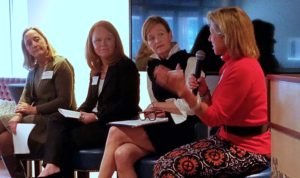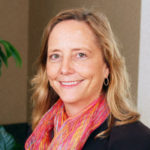By Nouchie Xiong, an MBA Candidate at the University of St. Thomas Opus College of Business, Class of 2019
 On April 16, CFA Society Minnesota hosted a panel discussion with prominent women in the financial services industry. Abbot Downing’s Deputy Chief Investment Officer, Carol Schleif, CFA moderated the event as panelists shared their unique experiences, concerns over the industry’s lack of diversity and career advice to young professionals.
On April 16, CFA Society Minnesota hosted a panel discussion with prominent women in the financial services industry. Abbot Downing’s Deputy Chief Investment Officer, Carol Schleif, CFA moderated the event as panelists shared their unique experiences, concerns over the industry’s lack of diversity and career advice to young professionals.
The panelists were:
- Beth Lilly, CFA – President and Portfolio Manager, Crocus Hill Partners
- Kate Kelly – Regional President & EVP at PNC Bank
- Mary Daugherty, CFA – financial educator, consultant and corporate director
The event began with the panelists introducing themselves and providing a brief history about their career journey and family life. The conversation was followed by answering the questions: why is there limited diversity in the financial services industry? What happened? How do we move the needle to thrive?
Beth began with an explanation that the number of women in the industry and their participation declined around 2008. Furthermore, there is a misperception that women must be good at math to succeed in the field when in fact that isn’t always true. Beth confessed she wasn’t the best in math herself but loves and has a real passion for the industry. Citing Peter Lynch, she clarified that working in this industry is 75% artistic and 25% scientific. Professionals in the field draw on a variety of skill sets to inform their research and decision-making. Women are also intuitive and their different perspective can lead them to see things that male colleagues might miss. There is also the false perception that work-life balance is impossible due to long hours. The reality however is that not everything is dictated by investment banking hours. In fact, there is flexibility as long as you’ve proven yourself. The onus is on companies to allow for this flexibility to support women who want a family or to care for their aging parents.
Kate added that participation from women on corporate boards has also flattened. Women need to participate in these roles because having more representation can influence culture and shift organizational dynamics long-term to be more inclusive. Carol elaborated on Kelly’s point with supplemental data: women as board members contribute to 42% increase in sales, 66% increase in capital, and 53% increase in equity. Ultimately, women contribute to profitability and sound business practices.
Mary also shared three theories of her own. One, women and minorities don’t major in something that doesn’t make money or get them a job. They tend to go into accounting and some find out that it’s a poor fit. However, when they are trying to switch careers they come up against companies that tend to hire people who follow a more traditional path into finance. Companies need to think differently if they want quality talent. Two, the STEM fields have done a good job attracting talent at an early stage and parents love STEM too. As a result, these young women opt out by the time college rolls around. Finance needs to do a better job in attracting talent early. Three, the lack of women colleagues in the male-dominated industry allows for the “macho effect” pushing away potential candidates. There are so many battles that women in the industry must decide whether to take on, take offline, or not pursue at all. An environment like this is not conducive to promoting inclusivity or equality.
Following the Q&A, the event concluded with the panelists imparting lessons learned and career advice.
Carol started by telling everyone to be bold, be strident, and put a stake in the ground. Most importantly, try not to overthink and make sure to read The Confidence Code. Beth talked about how she wished she had spent more time emotionally to develop a stronger self-esteem and encouraged everyone to work on themselves. Everyone should believe that they deserve to be where they want to be. Kate inspired everyone to think about pursing infinite desire rather than perfectionism. Mary concluded that learning to admit mistakes is also important to becoming a better decision-maker.






 With her merited achievements and stark determination, Dr. Mary Daugherty has successfully shaped a career that utilizes her CFA designation and PhD all the while keeping her personal values a priority. When hearing about her numerous successes, many wonder, “How did she get started?”
With her merited achievements and stark determination, Dr. Mary Daugherty has successfully shaped a career that utilizes her CFA designation and PhD all the while keeping her personal values a priority. When hearing about her numerous successes, many wonder, “How did she get started?”